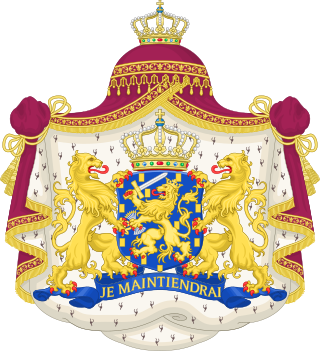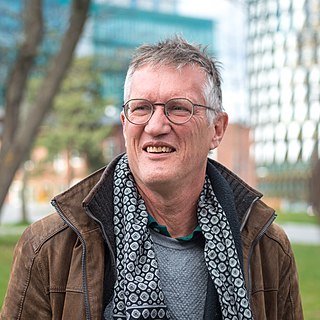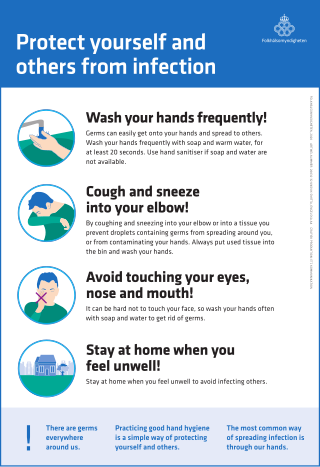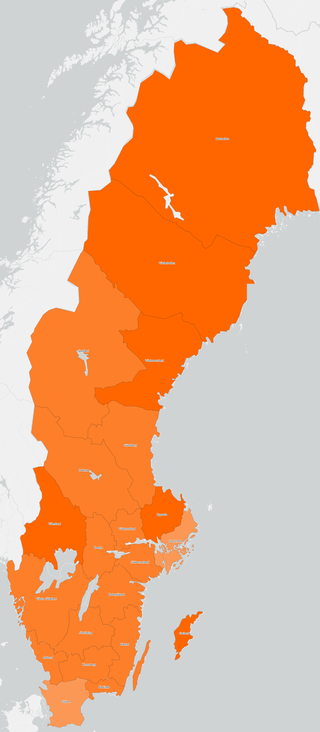
The Centers for Disease Control and Prevention (CDC) is the national public health agency of the United States. It is a United States federal agency under the Department of Health and Human Services, and is headquartered in Atlanta, Georgia.

The government agencies in Sweden are state-controlled organizations that act independently to carry out the policies of the Government of Sweden. The ministries are relatively small and merely policy-making organizations, allowed to monitor the agencies and preparing decision and policy papers for the government as a collective body to decide upon.

The Swedish Security Service is a Swedish government agency Organized under the Ministry of Justice. It operates as a security agency responsible for counter-espionage, counter-terrorism, as well as the protection of dignitaries and the constitution. The Swedish Security Service is also tasked with investigating crimes against national security and terrorist crimes. Its main mission, however, is to prevent crimes, not to investigate them. Crime prevention is to a large extent based on information acquired via contacts with the regular police force, other authorities and organisations, foreign intelligence and security services, and with the use of various intelligence gathering activities, including interrogations, telephone tapping, covert listening devices, and hidden surveillance cameras.
The National Institute of Allergy and Infectious Diseases is one of the 27 institutes and centers that make up the National Institutes of Health (NIH), an agency of the United States Department of Health and Human Services (HHS). NIAID's mission is to conduct basic and applied research to better understand, treat, and prevent infectious, immunologic, and allergic diseases.
The National Microbiology Laboratory (NML) is part of the Public Health Agency of Canada (PHAC), the agency of the Government of Canada that is responsible for public health, health emergency preparedness and response, and infectious and chronic disease control and prevention.
Social welfare in Sweden is made up of several organizations and systems dealing with welfare. It is mostly funded by taxes, and executed by the public sector on all levels of government as well as private organizations. It can be separated into three parts falling under three different ministries. Social welfare is the responsibility of the Ministry of Health and Social Affairs. Education is the responsibility of the Ministry of Education and Research. The labour market is the responsibility of the Ministry of Employment.
Health promotion is, as stated in the 1986 World Health Organization (WHO) Ottawa Charter for Health Promotion, the "process of enabling people to increase control over, and to improve their health."

The European Centre for Disease Prevention and Control (ECDC) is an agency of the European Union (EU) whose mission is to strengthen Europe's defences against infectious diseases. It covers a wide spectrum of activities, such as: surveillance, epidemic intelligence, response, scientific advice, microbiology, preparedness, public health training, international relations, health communication, and the scientific journal Eurosurveillance. The centre was established in 2004 and is headquartered in Solna, Sweden.

The Norwegian Institute of Public Health (NIPH) is a Norwegian government agency and research institute, and is Norway's national public health institute. It is subordinate to the Ministry of Health and Care Services. NIPH acts as a national competence institution in public health in a broad sense for governmental authorities, the health service, the judiciary, prosecuting authorities, politicians, the media and the general public, international organisations and foreign governments. The institute has around 1400 employees.

The National Institute for Public Health and the Environment is a Dutch research institute that is an independent agency of the Ministry of Health, Welfare and Sport.

The Ministry of Health and Social Affairs is a ministry in the Government of Sweden responsible for policies related to social welfare: social security, social services, medical and health care, public health and the rights of children, the elderly and disabled people.

Health in Sweden has generally improved over time, with life expectancy increasing, and is at a high level in international comparison. Life expectancy in 2021 was 84.8 years for women and 81.2 years for men and it increased 2.3 years on average from 2006 to 2019. However, the health situation varies between groups in Swedish society and equitable health has proven to be a challenge, with level of education, employment status and country of birth being factors that strongly influence health in the Swedish population. The two leading causes of death in Sweden are cardiovascular disease and cancer.

The California Department of Public Health (CDPH) is the state department responsible for public health in California. It is a subdivision of the California Health and Human Services Agency. It enforces some of the laws in the California Health and Safety Codes, notably the licensing of some types of healthcare facilities. One of its functions is to oversee vital records operations throughout the state.

The Swedish Civil Contingencies Agency is a Swedish administrative authority, organised under the Ministry of Justice. The agency is responsible for issues concerning civil protection, public safety, emergency management and civil defence. Responsibility refers to measures taken before, during and after an emergency or crisis. MSB work in close cooperation with the municipalities, the county councils, other authorities, organisations and the private sector to achieve increased safety and security at all levels of society. This is done through education, support, training exercises, regulation and supervision.
Thomas Lindhqvist is a Swedish academic. He is credited for introducing the concept of extended producer responsibility. He is currently associate professor and director of research programs at the International Institute for Industrial Environmental Economics at Lund University in Sweden

The COVID-19 pandemic in Sweden was a part of the pandemic of coronavirus disease 2019 caused by severe acute respiratory syndrome coronavirus 2. As of 22 March 2023, there have been 2,701,192 confirmed cumulative cases and 23,851 deaths with confirmed COVID-19 in Sweden. Sweden ranks 57th in per capita deaths worldwide, and out of 47 European countries, Sweden places 30th. A 2022 estimate of excess mortality during the pandemic using IHME COVID model estimated 18,300 excess deaths during 2020-2021 The Economist model value estimated 13,670 excess deaths between 16th 2020-Mar 6th 2022.

Nils Anders Tegnell is a Swedish civil servant and physician specialising in infectious disease. From 2013 until his resignation in March 2022 he was Sweden's state epidemiologist.

The state epidemiologist, or the chief epidemiologist is a Swedish civil servant. The current state epidemiologist is Anders Lindblom, with Anders Wallensten as deputy state epidemiologist.

Sweden's unique response to the COVID-19 pandemic has been the subject of significant controversy in both domestic and international circles. Unlike most countries, which strongly recommended or introduced widespread sector closures, quarantining, and lockdown measures to curb the spread of the coronavirus disease 2019, the government of Sweden took a more lenient approach to the pandemic, prioritizing the economy and only pursuing social distancing measures such as bans on large gatherings and limited travel restrictions.

Vaccination against COVID-19 in Sweden started on 27 December 2020 after the approval of the Pfizer–BioNTech vaccine by the European Commission. In Sweden, the Public Health Agency has been commissioned by the government to create a vaccination plan. Sveriges riksbank, the central bank of Sweden, predicts that efficient vaccination against COVID-19 has macroeconomic benefits. As of 20 April 2022, 87.1% of people in Sweden have received at least one dose, with a total of 21,491,717 doses administered. At least one vaccine has been approved for all age groups 12 and older. Children younger than 12 in high risk groups can also be vaccinated.














